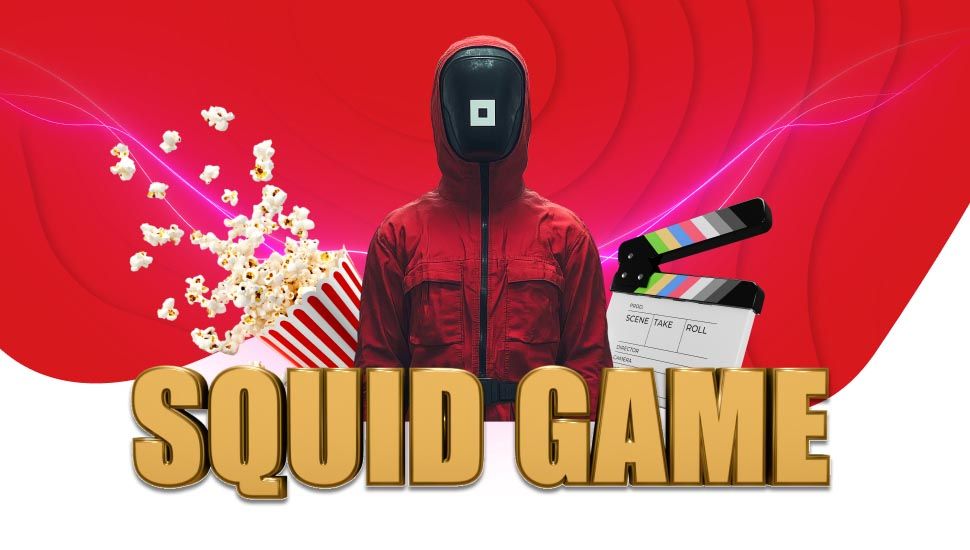
Squid Game: From Streaming Hit to Multi-Market Power
When Parasite won 6 Oscars at the 2020 Academy Awards, it did more than make history - it marked a shift in how the world viewed South Korean storytelling. Just over a year later, Squid Game took it further, spreading through streaming platforms, social media, and global pop culture.
Premiering on Netflix in September 2021, Squid Game quickly exceeded expectations. Within weeks, it had become the platform's most-watched series, topping charts in over 90 countries. Viewers were hypnotised, debating favourite characters, mimicking scenes on TikTok, and turning the show's attributes into part of everyday culture.

Squid Game also proved that a non-English series could sit at the centre of mainstream entertainment, not as a side offering, but headlining. The show's success helped pave the way for other regional productions, showing that cultural specificity could make a story stronger, not limit its reach.
This article looks at how a dark story about survival turned into something much bigger. Squid Game journey went beyond TV - it showed up in games, clothing, music, and more.
What Made Squid Game Feel So Persona
Squid Game didn't need to explain itself to feel relatable. At its core, it showed people caught in a system they couldn't escape – stuck in debt, desperation, and rules they didn't write. That idea wasn't distant or abstract. For many, it looked uncomfortably familiar.
What gave the show its real weight was the simplicity of the setup. Ordinary people were pushed into unbearable situations, not out of evil or good, but because they didn't have many choices left. This made it easy for everyone watching to put themselves in their shoes and even become participants in some way. Viewers could feel the intensity of each choice, drawn in by the idea that anyone might make the same (or worse) decisions under pressure. The childlike style of games only made it more emotionally relatable: simple, visual, and instantly recognisable across cultures.
Class divide, rising debt, the fear of being left behind - these themes shaped every decision in the story. That is why it connected with so many people. It wasn't trying to be symbolic or dramatic; instead, it just showed what happens when people are pushed too far.
Director Hwang Dong-hyuk once mentioned that the script was turned down for years for being "too unrealistic." Ironically enough, what once seemed tough to believe in felt more real than most dramas
Visual Code and the Viral Formula
One reason Squid Game spread so fast was its aesthetics - red jumpsuits, masked guards marked with triangle, square, and circle symbols, the animatronic doll, cookies with stamped shapes, and more. These visual cues became signature attributes of the story.
And we can't forget about the audio, too. From the eerie tune before games began to the sharp shift in tone when guards entered the common room, the sound greatly complemented the visuals. Clips from the show started appearing everywhere on social media, like TikTok, Instagram, and YouTube, often without needing any context. A glance or a short audio was enough to make it click right away.
That strong identity gave rise to something bigger. People dressed as guards for Halloween, shared edits of the glass bridge challenge, and even mimicked the "Red Light, Green Light" scene using the Mugunghwa doll's voice. As people nowadays would say - it went viral. It became something the audience could perform, remix, or even wear.
Some of the most discussed moments online included the betrayal during the marble game, the final twist about Player 001, and the scene where Gi-hun chooses not to board his flight. Each carried enough emotional weight to inspire debates, edits, breakdowns, and reaction videos. The glass bridge challenge stood out as one of the most shared and memeable moments, both for its suspense and for how easily it could be clipped and edited.
After the finale, conversations didn't stop. Fans on Reddit and Twitter picked apart the logic behind each challenge and unpacked character motivations, keeping the series relevant long after the release. TikTok creators adapted their own stories onto the original plot, while others used the soundtrack to create trendy videos. Google Trends also showed a sharp spike in related searches — from "Squid Game mask" to "Squid Game cookie" - reflecting how quickly viewers turned into participants.
In that way, Squid Game created its own visual and emotional language. Its symbols caught on quickly, showing up in fan recreations, costume videos, and audio clips used in TikToks and parodies. The line between viewer and participant blurred quickly, turning the audience into part of the show's life after the release.
From Story to Franchise
After its record-breaking success, Squid Game didn't stay limited to the series only. Netflix followed up with Squid Game: The Challenge, a reality competition that recreated the show's games in an adapted format for TV & streaming. Its concept was to keep the hype going and bring the series's experience into the real world, with players competing for cash in a high-stakes setting.
Outside of Netflix, the concept took off in other directions too. MrBeast, the top 1 creator on YouTube with over 400 million subscribers, famously recreated the full Squid Game experience, building sets from the series and inviting hundreds of players to compete (without the deadly consequences, of course). The video quickly went viral, pulling in millions of views.
The series also inspired unofficial fan games, mobile apps, and early virtual reality projects. Players could walk through 3D versions of the dormitory, attempt the dalgona cookie challenge, or compete on glass bridges. Merchandise soon also appeared in the form of costumes, figurines, and collectables sold online and at themed events.
In iGaming, the influence moved even further. As industry experts, we often note that hit TV shows regularly become the foundation for slot design, and Squid Game was no exception.

Titles like Narcos and Rick and Morty had already entered the world of slot design. In early 2025, Squid Game: One Lucky Day by Light & Wonder was released as the official slot based on the series. The game quickly gained traction and went on to win Online Slot of the Year at the Global Gaming Awards EMEA 2025. From the masked guards to the candy challenge, the slot used familiar visuals to turn the show's tension into gameplay features.
Released in 2021, Squid Game became Netflix's most-watched series at the time, sparking a wide range of follow-up projects - from a reality competition and fan-made games to merchandise and slot machines. What started as a story about unfair systems and social pressure soon evolved into a worldwide trend. These themes about everyday struggles were quickly packaged into content to play, wear, and monetise, showing just how thin the line can be between storytelling and sales.
The Commercial Afterlife
By the time Squid Game had become mobile apps, Halloween costumes, and slot machines, its original message had already started to shift. What began as a serious take on financial struggle had become something people could buy into, and quite literally. The show's rise showed just how fast meaning can be repackaged and sold (all according to the finest traditions of capitalism).
It is important to know that this is not a new pattern. Fight Club, for instance, a film that critiqued consumerism and masculinity in crisis, was later used to sell soap and graphic tees with Brad Pitt's face on them. V for Vendetta, originally an anti-authoritarian graphic novel, gave us the Guy Fawkes (Anonymous) mask, which is now a mass-produced item worn at protests and is a subject of same-day delivery on Amazon. These are examples of how cultural critique often ends up feeding the very systems it questions.
Squid Game followed a similar, if not identical, path. Its visuals, themes, and emotional tone were powerful enough to create waves in modern pop culture. However, those same elements were also easy to reshape, reuse, and repackage. A slot game built around its most tense moments, for example, turns the fear and risk into a playable feature. And it's no surprise - tension sells well, especially when wrapped in high-end design and attached to a familiar name.
In some way, this shift changed what the show stood for. In Squid Game's case, the symbols it used to represent the struggle and hardships stopped being warnings about unfair systems. They became part of the entertainment and things people could buy.
It is often said that today, nothing stays critical for long. The very moment a story gains traction, it becomes part of the content loop, which rewards what is easily consumed, and not necessarily what is deeply understood. Squid Game showed how the highlighted in the series stress could resonate with viewers, and how it impacted the streaming algorithm, the merch cycle, and even the gambling industry.
A show about money struggles and survival turned into a way to attract viewers, sell products, and launch new entertainment projects. Its strongest message started to fade as it got shown and shared over and over. The more people saw it, the more it became part of the world it was initially meant to question.
With all that said, it doesn't make Squid Game any less significant. If anything, it proves just how tightly culture and commerce are linked. The show left a mark with its message, and with what happened next. Its journey from protest to product is a story in itself that reflects a larger truth about how the media works today.
The Post-Squid Game Effect
The show's success was so massive that it shifted viewer habits and the industry as a whole. Its triumph redefined what global content could look like on a streaming platform. Before 2021, non-English-language series were rarely treated as headline content outside their home markets, but after the Squid Game, that changed. For Netflix, the series proved that a Korean-language thriller could reach a global audience and even set new standards.
Squid Game's impact reached far beyond Korean drama, sparking new interest in shows from across Asia, including Thailand and Japan. Korean dramas were already popular in those parts of the globe, but Squid Game gave them mainstream visibility in the US, UK, and Europe. Viewers who previously stuck to familiar content and skipped the international shows were now exploring titles from different cultures and regions.
In the months following its release, Netflix doubled down on regional originals. Shows like All of Us Are Dead and Physical: 100 quickly climbed the charts, combining local concepts with globally relatable topics. This strategic pivot in content investment played a key role in Netflix’s broader approach to maintaining its global streaming dominance, as explored in this analysis on Netflix’s content-driven resilience and pricing strategy. The 8 Show, often seen as a thematic cousin to Squid Game, took the idea of games and desperation even further, with its own take on inequality and drama. Each of these titles builds on the same strengths: well-developed visuals, real-world tension, and scenes that work well on digital platforms.
Worth noting that it wasn't only Netflix that felt the change. Competing platforms significantly boosted their investment in Asian series, festivals highlighted more creators from the region, and Western studios rushed to adapt similar ideas, aiming for the same level of hype and popularity.
No one can say for sure if this is here to stay or just part of a trend. Still, it is clear that foreign stories are now receiving more attention than ever.
The End Result
Squid Game told a simple story about people trapped by debt and fighting to survive. Its themes of inequality and pressure were front and centre, driving every choice and challenge. As the show spread, its most recognisable attributes took on a life of their own. What started as part of the story became symbols people connected with, shared, and wore. And although the original message didn't evaporate, it became harder to separate from the products and spin-offs that followed.
It's a pattern we have seen before - stories meant to question power often end up reinforcing it. Like Fight Club or V for Vendetta before it, Squid Game became a symbol first, a product second, and a warning only in retrospect.
Even now, the show's visual and audio attributes remain familiar long after the plot has faded. They have been reused, edited, and pushed into new formats until the show itself became an example of how stories are stretched in today's content economy. With Season 3 set to release later this year, we are about to see whether the next chapter reclaims the original message, or adds another layer to its repackaging. Because in a time shaped by hypercapitalism, even a story about life and death can end up as a slot machine.
Other Articles You May Be Interested In






